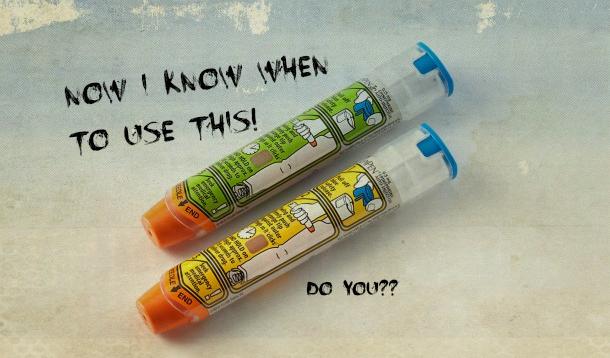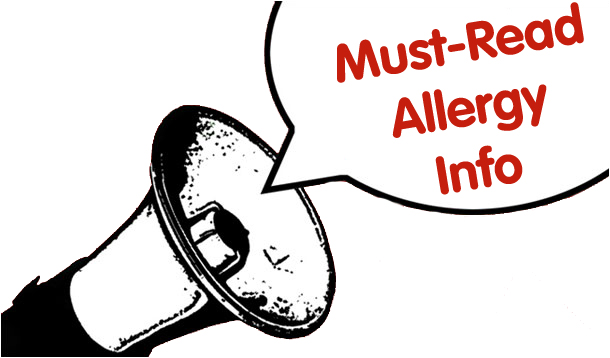
One of the many scary and confusing things about dealing with severe allergies is that it can present differently each time. When you think of an allergic reaction, most of us picture hives and itchy skin, right? At least I did when my daughter was diagnosed eight years ago. But there are other symptoms of a SEVERE allergic reaction that can be way harder to recognize.
It's true that some anaphylactic reactions include hives and itching, but there are so many other serious symptoms that indicate we could be in for big allergy trouble. In order for me to know if my daughter is having an anaphylactic reaction, here are the symptoms I have to look for:
*Any delay in recognizing the symptoms of a severe allergic reaction can result in a fatal outcome.
Here's the problem. On their own, many of these symptoms don't appear to be life-threatening. While a reaction may initially seem to be minor, the severity can suddenly increase and become life-threatening. But you never really know what you're in for. This is what makes it terrifying when trying to react appropriately. Also, no two reactions are necessarily the same. One time my daughter may start vomiting because she has ingested an allergen, another time she gets a few hives on her face. How am I supposed to react properly when you never know exactly what you're dealing with?
The first thought that races through my mind when my daughter tells me she doesn't feel well is, "Oh My God! What does this mean? Is she coming down with the flu or is she having a reaction to something she ate?"
For the next little while we watch to see if there are any symptoms specific to having an anaphylactic reaction. If we see some symptoms which MAY indicate a reaction, that's when we start panicking and wonder, "WHEN DO WE ADMINISTER AN EPIPEN?"
I met up with well-known allergist Dr. Susan Waserman, the President of the Canadian Society of Allergy and Clinical Immunology, at a roundtable about allergies, and asked her opinion as to when to administer an EpiPen.
She recommends that when it doubt, use an EpiPen! In the event of an allergic emergency, every second counts. I need to always have easy access to an EpiPen and be sure to use it at the first signs of an allergic reaction.
A few other interesting pieces of information I've picked at the Allergy Roundtable:
I will do whatever I have to in order to keep my daughter safe. If you have kids or know someone with severe allergies, I know you feel the same way too.
 Severe allergies are on the rise in Canada.
Severe allergies are on the rise in Canada.
This is proudly sponsored by EpiPen®.
EpiPen.ca
The opinions expressed in this post are the opinions of the individual author and may not reflect the opinions of Pfizer Canada, the Canadian distributor of EpiPen. Pfizer Canada reviews all material to ensure medical accuracy of statements.
EpiPen® and EpiPen® Jr (epinephrine) Auto-Injectors are indicated for the emergency treatment of anaphylactic reactions in patients who are determined to be at increased risk for anaphylaxis, including individuals with a history of anaphylactic reactions. Selection of the appropriate dosage strength is determined according to patient body weight.
EpiPen® and EpiPen® Jr Auto-Injectors are designed as emergency supportive therapy only. They are not a replacement for subsequent medical or hospital care. After administration, patients should seek medical attention immediately or go to the emergency room. For the next 48 hours, patients must stay within close proximity to a healthcare facility or where they can call 911. To ensure this product is right for you, always read and follow the label. Please consult the Consumer Information leaflet in your product package for complete dosage and administration instructions.
© 2013 Pfizer Canada Inc., Kirkland, Quebec H9J 2M5 • Toll free: 1-877-EPIPEN1 (1-877-374-7361)
EpiPen®, EpiPen® Jr are registered trademarks of Mylan Inc. licensed exclusively to its wholly-owned affiliate, Mylan Specialty, L.P.; sub-licensee, Pfizer Canada Inc., Kirkland, Quebec H9J 2M5